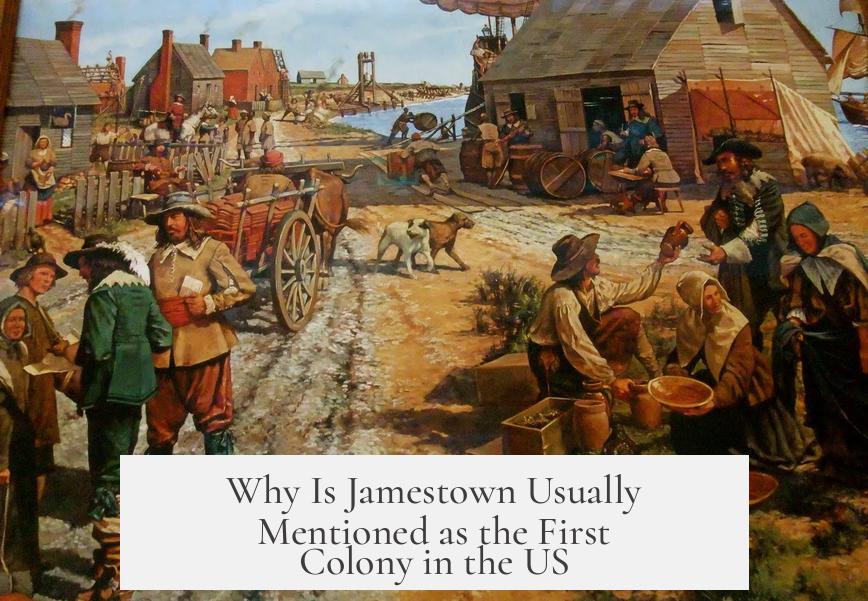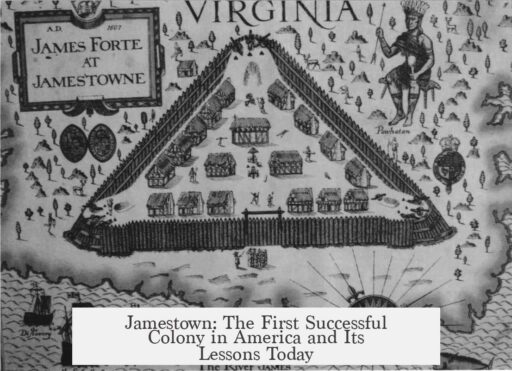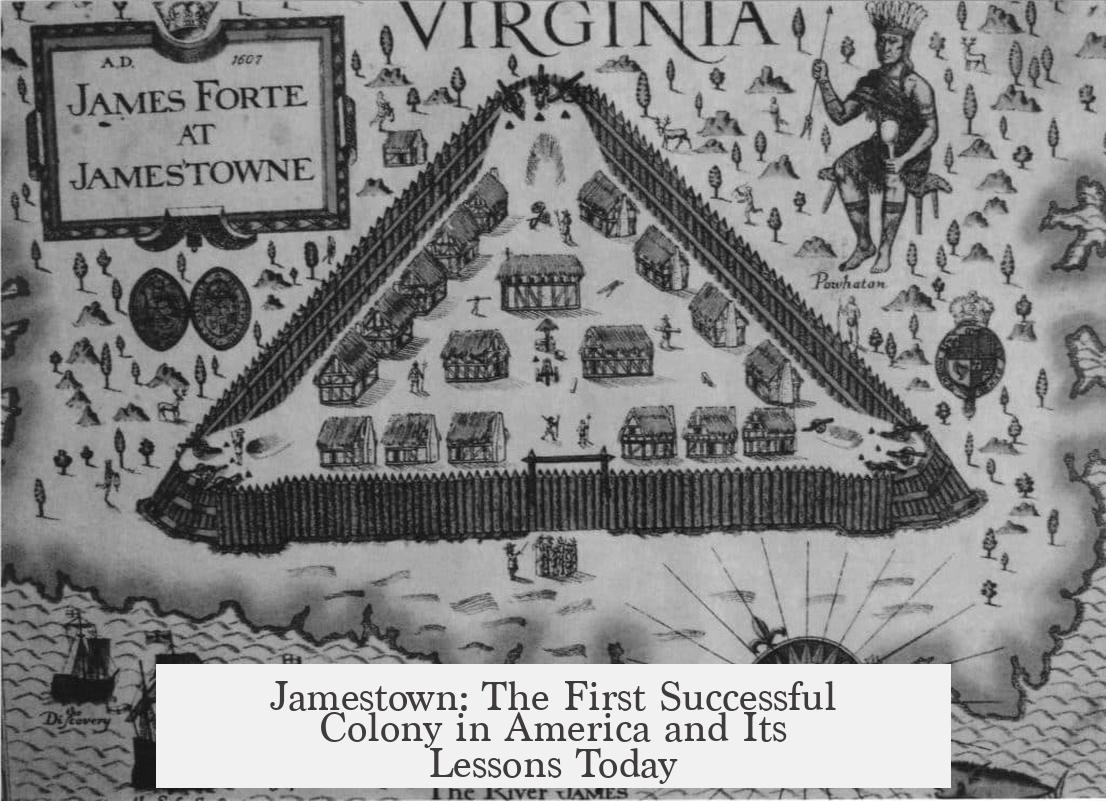Jamestown is usually mentioned as the first colony in the US because it serves as a foundational symbol of English heritage, self-governance, military resilience, and economic innovation that early Americans embraced as central to their national identity.
The story of Jamestown dates back to its founding in 1607. It was the first permanent English settlement in North America, establishing a foothold for English culture and political systems. This fact became crucial as the original colonies evolved into the United States and sought a shared historical narrative. Jamestown’s English roots and its difficult yet ultimately successful path symbolized the qualities Americans admired: innovation, resilience, and independence.
Unlike some other colonies, Jamestown developed through creative English methods. Early settlers initially searched for gold and trade goods but transitioned toward a plantation economy centered around cash crops like tobacco. This economic model spread across a broad geographic region, influencing the southern colonies and shaping a significant portion of America’s economic foundation.
Another key factor is Jamestown’s military history. Its forty-year conflict with the Powhatan Confederacy demonstrated early colonial resilience and martial success. These episodes shaped the American mindset of survival and conquest, reinforcing Jamestown’s importance in the national story.
Politically, Jamestown introduced the House of Burgesses in 1619, the first elected legislative assembly in America. This established early self-governance and signaled a move away from direct monarchy control. This political heritage fits into America’s pride in rejecting monarchy and embracing democratic principles.
Jamestown’s role as an origin story competes with Plymouth’s, but Jamestown often rises in prominence because it symbolizes broader economic and political themes across a larger part of the country. It reflects a shared English legacy and a successful experiment in democracy and colonization that resonates widely.
Rediscovery of the original site in the 1990s and modern recognition, including royal visits, have renewed interest. Additionally, demographic changes and increasing secularism have shifted the national founding narrative toward Jamestown, emphasizing democratic entrepreneurship over strictly religious founding myths.
- Jamestown is the first permanent English colony in America.
- It symbolizes English heritage, self-rule, and economic innovation.
- The colony’s military resilience inspired American identity.
- The House of Burgesses marked early democratic governance.
- Jamestown’s story fits a broader, geographically larger national narrative.
- Modern rediscovery and demographic shifts support Jamestown’s prominence.
Why Is Jamestown Usually Mentioned as the First Colony in the US?

Jamestown usually gets crowned as the first colony in the US because it ticks all the boxes of America’s national origin story: English roots, economic innovation, self-governance, military grit, and cultural resilience. It’s not just about being “first”; it’s about what Jamestown represents.
Let’s unpack this. Why does Jamestown still hold this title over other early settlements like Plymouth? What makes it the go-to origin story for Americans? Grab a virtual cup of coffee and let’s travel back to 1607.
First, Jamestown’s Englishness is a big deal. While many early colonies were started by various European nations, Jamestown’s legacy aligns with how Americans envision themselves: innovative, resilient, and independent. The settlers weren’t simply looking for gold—they combined bold leadership with creative English methods to survive and thrive. When tobacco became the cash crop, it shaped a plantation economy that echoed across the southern colonies. It’s like the American “can-do” spirit in a nutshell.
Ever thought about how Americans love a wrestling match story? Jamestown fought off the Powhatan Confederacy in a grueling war that lasted nearly 40 years. Those battlefield experiences shaped the idea of American toughness and perseverance. After the Revolutionary War, memories of Jamestown’s martial resilience only grew stronger in the national psyche.
But don’t think Jamestown’s importance rests only on survival and conflict. The colony’s political innovation is another cornerstone. In 1619, Jamestown established the House of Burgesses, the first representative government in English America. This early form of self-governance gave settlers a taste of voting power and ruling over their own affairs. It was a direct challenge to the monarchy’s distant power and planted seeds of skepticism toward hierarchies—seeds that would grow into the very foundation of American democracy.
Now, you might ask, “What about Plymouth?” Many historians debate that one day, but Jamestown often rises to the top because of its economic model. Jamestown’s plantation trade shaped a vast geographic region and influenced economic structures well beyond New England’s unique communities. This broader reach makes Jamestown a common denominator across much of the country’s early development.
History isn’t static, though. Jamestown’s spotlight gained sparkle in the 1990s with the rediscovery of the original settlement. Archaeological finds brought fresh evidence to light, renewing interest in Jamestown’s pivotal role. Plus, high-profile visits, like one from the late Queen Elizabeth II in the 2000s, and the symbolic naming of the colony after King James I (the same king from the Bible), helped cement Jamestown’s prestige.
The story of Jamestown also shifts alongside America’s population geography. Back when most Americans lived north of the Mason-Dixon Line, northern colonial histories dominated. But as demographics evolved and more people live in the South now, Jamestown’s southern-focused origin story resonates more deeply across the country.
Here’s a neat twist: rising secularism in the US also plays a part. Plymouth stands out for its strict religious roots, often marked by the stark narratives around pilgrimage and events like the Salem witch trials. Jamestown’s tale is less about rigid religiosity and more about democratic entrepreneurial spirit. This shift aligns well with modern American values of innovation and independence without the heavy religious overtones.
“Jamestown isn’t just a dot on the map; it’s the story of how America saw itself becoming a nation—English yet distinctly American, struggling yet thriving, governed by its people, and economically ambitious.”
Want to grasp this whole idea even better? Think of Jamestown as the blueprint for the “American Dream” in its earliest form. It’s neither the perfect nor the only story but manages to unify political, economic, and cultural themes many Americans embrace.
What Can We Learn from Jamestown Today?
- Innovation Matters: Jamestown settlers didn’t just try to recreate England; they adapted and innovated with cash crops and governance that answered their unique challenges.
- Resilience Defines Identity: A nearly 40-year war with the Powhatan Confederacy taught early Americans about surviving under pressure—something the nation prizes today.
- Self-Governance Is a Foundation: The House of Burgesses laid groundwork for democratic ideals Americans took seriously, making Jamestown a political trailblazer.
- Economic Impact Shapes History: The plantation economy birthed in Jamestown influenced far-flung regions and helped solidify an economic system that endured.
Jamestown’s story explains more than “who was first.” It tells us how the American identity got forged from English beginnings, hard fights, self-rule, and trading ambitions. It became a comfortable narrative that early Americans used to connect politically and culturally.
The next time you hear about Jamestown as the first colony, remember—it’s not just a historical footnote. It’s the framework for a nation that values grit, governance, and growth. Plymouth might represent a different ideal, but Jamestown’s story feels like a common thread through much of America’s early fabric.




